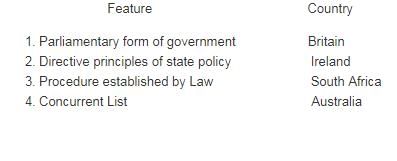Polity - MCQ Online Test (3) - UPSC MCQ
25 Questions MCQ Test Polity and Constitution (Prelims) by IAS Masters - Polity - MCQ Online Test (3)
Company’s monopoly of trade with India was ended by which Act?
Government of India act 1861 provided for which of the following?
How many languages have recongnised by the Constitution?
The office of Governor General of India was created by
On whose recommendation was the Constituent Assembly formed?
The speaker can ask a member of the house to stop speaking and let another member speak. This is known as
Which one of the following schedules of the Constitution of India contains provisions regarding anti-defection Act?
Which one of the following is part of the Electoral College for the election of the President of India but does not form part of the forum for his impeachment?
The primary function of the Finance Commission in India is to
Which one of the following statements correctly describes the Fourth Schedule of the Constitution of India?
The salaries and allowances of the Judges of the High Court are charged to the
Which one of the following Bills must be passed by each House of the Indian Parliament separately, by special majority?
The resolution for removing the Vice-President of India can be moved in the
Consider the following statements:
1. The parliament of India consists of three parts viz. the President, the Council of states and the House of the people.
2. The President of India is not a member of either House of Parliament.
3. The Parliament is the legislative organ of the Union Government.
Which of the Statements given below is/are correct?
Consider the following statements:
1. The fourth schedule of the constitution deals with the allocation of seats in the Rajya Sabha to the states and Union territories.
2. Rajya Sabha has 245 members; out of these 6 members represent the Union territories.
Which of the Statements given below is/are correct?
Which of the following statements is true with respect to 42nd Constitutional Amendment Act?
1. Fundamental Duties were incorporated into the Constitution of India by the 42nd Constitutional Amendment Act, 1976
2. Ten Fundamental Duties were included by this Amendment
3. The 11th Fundamental Duty was incorporated by the 86th Constitutional Amendment Act, 2002
Select the correct answer using the code given below.
Fundamental Duties were added on the recommendation of which committee?
Consider the following statements:
1. The duties enumerated in Art. 51-A are non-statutory duties and are not enforceable by law.
2. Violation of the Fundamental Duties can be met with Punishment but constitution doesn’t mention any penalty for its violation.
3. Parliament can prescribe penalty for the violation of Specific Duties
Select the correct answer using the code given below.
Which of the following is/are a Fundamental Duty?
1. To uphold and protect the sovereignty, unity and integrity of India
2. To exercise our Universal Adult Franchise at the time of general elections
3. To value and preserve rich heritage of our composite culture
Select the correct answer using the code given below.
The 86th Constitutional Amendment Act, 2002 puts duty on parent or guardian to provide opportunities for education to his Child or Ward in the age of
|
36 videos|127 docs|136 tests
|
|
36 videos|127 docs|136 tests
|




















